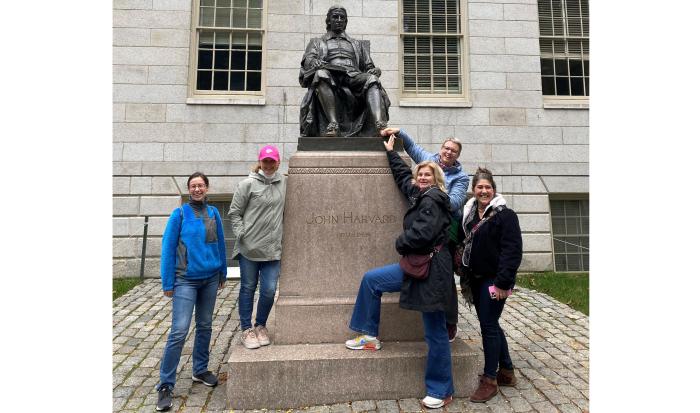
QCC had the privilege of hosting a cultural job exchange through the Netherlands Professional & Cultural Exchange Program thanks to Coordinator of Transfer/Articulation Beth Fullerton. Fullerton and Nicole Wijkamp, a career and student support counselor at Rijn Ijssel in the Netherlands, were matched through the program, which began with Wijkamp's visit to QCC. For two weeks, Wijkamp shadowed Fullerton and toured colleges and universities around the state, learning about higher education in the U.S. and sharing the Dutch education experience.
Wijkamp was gracious enough to give a Lunch and Learn presentation where she described what the higher education world is like in the Netherlands and what her position entails.
Rijn Ijssel is a vocational college in Ansel, Holland that has an approximate enrollment of 9,000 full-time students and 2,500 part-time students. Similar to QCC, there is a range of nationalities represented, many coming from Turkey, Afghanistran and Morocco as well as refugees from Ukraine.
In the Netherlands, primary education is mandatory and covers ages four to 12. Following primary education, there are three pathways that students can take, based on testing and teachers advisement.
According to Wijkamp, one major difference between the Netherlands and the U.S. is that universities in the Netherlands cost approximately $2,600 per year and everyone pays the same amount. Vocational schools can cost approximately $1,300 per year in the beginning levels. While these costs are very low compared to the U.S., there usually aren't dorms available for students and housing can be quite expensive. Additionally, if students don't complete their program or don't complete their program by a certain time, the school won't receive a complete payment.
One aspect of Wijkamp's role at the college is being a part of the "Care Structure," which connects students with supports like financial assistance and mental health services. Wijkamp meets daily with anywhere from 5 to 30 students. She also works with students who have learning and physical disabilities and her caseload is about 25 students at a time. Additionally, she gives workshops, coaching faculty on working with students who have learning and physical disabilities.
A similarity Wijkamp found with students in both countries was the effect of COVID-19.. Wijkamp said she noticed a lack of social skills and a general anxiety when students returned after the pandemic. She also mentioned that students were being effected by other global issues such as climate change, war and the high cost of living.
Ultimately, all this fuels Wiljkamp to continue focusing on work that will empower students.
"I love what I do,"Wijkamp said, adding, "You have many services here. It's inspiring."
In May of 2024, Fullerton will visit Wijkamp in Ansel for the second part of the exchange. We look forward to what she will learn!
